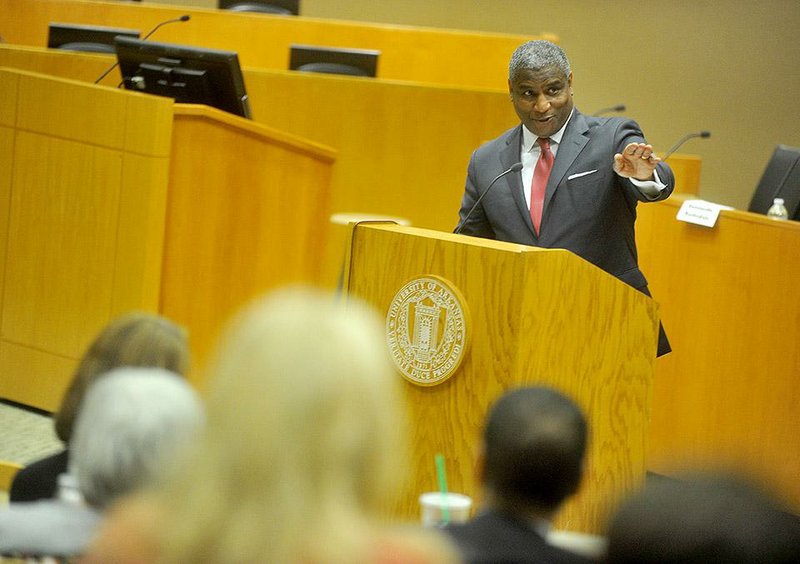A legal symposium devoted to education issues included remarks Friday from George Haley, a pioneering attorney who was among the first black students admitted to the University of Arkansas School of Law when he enrolled in 1949.
"We all had to accept and cope with the most demeaning and unpleasant requirements of operating in special facilities, like separate study rooms, separate restrooms, separate chairs set apart from white students," Haley, 89, told the crowd gathered for the Wiley A. Branton Issues Symposium at UA's School of Law.
Also among the speakers was Rodney Slater, a former U.S. secretary of transportation who served during the administration of President Bill Clinton. The event was put together by the National Bar Association, an organization whose membership is mostly made up of black attorneys, judges and law students.
Haley, 89, is the only surviving member of a group known as the Six Pioneers, black students who helped integrate UA in an era of mandatory racial segregation. Haley followed law school with a life as an activist and a lengthy career in federal government, including time serving as a U.S. ambassador to Gambia.
"Closing the educational achievement gap between African-Americans and other communities is the new civil-rights challenge," said Haley, who traveled from Maryland to attend the event. During a break between talks, many in the crowd sought him out for photographs.
Haley's remarks also included an introduction for Slater, the recipient of the National Bar Association's 2014 Wiley A. Branton Award.
Slater, a UA law alumnus who is now a partner in a Washington, D.C.-based law firm, spoke about the accomplishments of the Six Pioneers, which included the symposium's namesake, Branton, who went on to serve as a law school dean at Howard University.
Slater said the Six Pioneers "saw in their time access to education as a springboard to public service and engagement as 'we' -- as 'we,'" he repeated for effect, "must also in our time."
A panel discussion followed to present ideas and concerns related to education, one of several planned talks relating to the event's theme, "Education: The New Civil Right."
Cynthia Nance, a dean emeritus and professor at UA's law school, moderated one discussion in which attorneys shared concerns they had about access to education.
Antoinette Barksdale, an attorney in the U.S. Department of Justice's Civil Rights Division, expressed concern about data indicating that black students are expelled from school at a much greater rate than white students.
"It all starts there. You start expelling them, you're not giving them the same discipline that you're giving their white peers," Barksdale said. While her job involves employment discrimination, such disparities in education "are the things that the educational section of the Department of Justice are looking into," Barksdale said.
Stephen Clowney, an associate professor of law at UA, presented data stating that black youths are much more likely to grow up in neighborhoods where more than 30 percent live in poverty. He went on to describe his criticism of school systems that enroll students based on where the families of students live, advocating for reform to include more charter schools whose enrollment is based on parental choice.
"If you don't like school choice, I will tell you this: We already have a system of school choice," Clowney said. "It's just that that choice is being made, parents are choosing their schools based on how expensive a house they can afford. I think that is a huge moral wrong."
NW News on 11/08/2014

